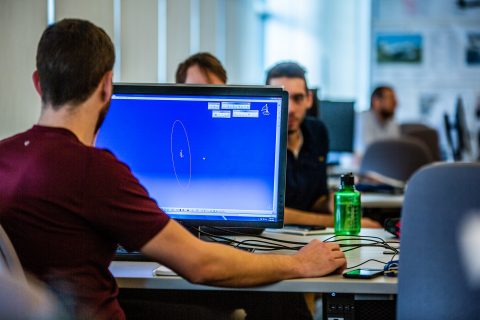Computer Science (MApCompSc)
Program overview
The Master of Applied Computer Science (MApCompSc) increases students' knowledge of both the theoretical and practical applications of computer science. The program is designed for those who want to reorient their careers toward computer applications in industry and commerce. The degree is full-time, with a normal duration of two years. However, candidates employed in business, government or other academic programs may study on a part-time basis. Graduates of the MApCompSc are highly sought-after as qualified professionals able to design and create new softwares, modify and test existing ones, devise efficient algorithms, and implement techniques for computerized applications in a broad range of industries. The program offers students a wide variety of stimulating core and elective courses on a complete range of computer science and software engineering topics.
Program structure
Degree Requirements
Fully-qualified candidates are required to complete a minimum of 45 credits.
Please see the Computer Science and Software Engineering Courses page for course descriptions and prerequisites.
Applied Computer Science MApCompSc (45 credits)
| 16 | credits chosen from the Applied Computer Science MAPCompSc Core Note: All Core courses must be successfully completed within the first four terms of the program.
|
| 29 | credits chosen from Applied Computer Science MAPCompSc Electives |
Applied Computer Science MAPCompSc Core (16 credits)
Applied Computer Science MAPCompSc Electives (29 credits)
| 20 | credits minimum chosen from the following Topic Areas: C01 - Developments in Computer Science C02 - Parallel and Distributed Systems C03 - Image Processing/Pattern Recognition and Graphics C04 - Software Systems and Languages C05 - Information Processing and Management C06 - Scientific Computation and Algorithms C07 - Artificial Intelligence and Human-Machine Communication |
| 8 | credits maximum chosen from the following computer science courses at the 6000 level:
|
Remaining credits may be chosen from the topic areas and courses listed below: C08 - Developments in Software Engineering C09 - Software Development C10 - Software Architecture and Design C11 - Software Maintenance and Quality
| |
Students may select a maximum of five one-credit courses from the following:
|
This program offers a co-op option — a paid, full-time internship of four or eight months where you'll put classroom learning into practice.
Admission requirements
Proficiency in English
Proficiency in English. Applicants whose primary language is not English must demonstrate that their knowledge of English is sufficient to pursue graduate studies in their chosen field. Please refer to the English language proficiency page for further information on requirements and exemptions.
Application process
Application deadlines

FALL
July 1 (Canadian resident)
March 1 (U.S. and international)

WINTER
November 1 (Canadian resident)
July 1 (U.S. and international)

SUMMER
March 1 (Canadian resident)
November 1 (U.S. and international)
Priority will be given to complete applications submitted by the deadline. In some cases, programs may continue to accept applications as long as there is space available.
International students: Considering the waiting period involved in meeting the entry requirements to Canada and Quebec, we strongly encourage international applicants to apply early and submit supporting documents prior to the deadline.
Tuition & funding
Tuition and fees
Tuition and fees of the program may depend on your student status, among other key factors. Estimate these costs based on the most common situations.
Awards and funding
Funding packages are generally available for students in thesis-based programs. Course-based students may be eligible for a number of donor awards, and may consult with their department for program-specific opportunities.
Out-of-province students
Get $3,000 in special funding for non-thesis master's programs. Learn more
Other programs of interest

Conduct research with faculty members that are leaders in various fields of computer science. Engage in research aimed at advancing the design of technological systems.
Department
Department of Computer Science and Software Engineering
Faculty

